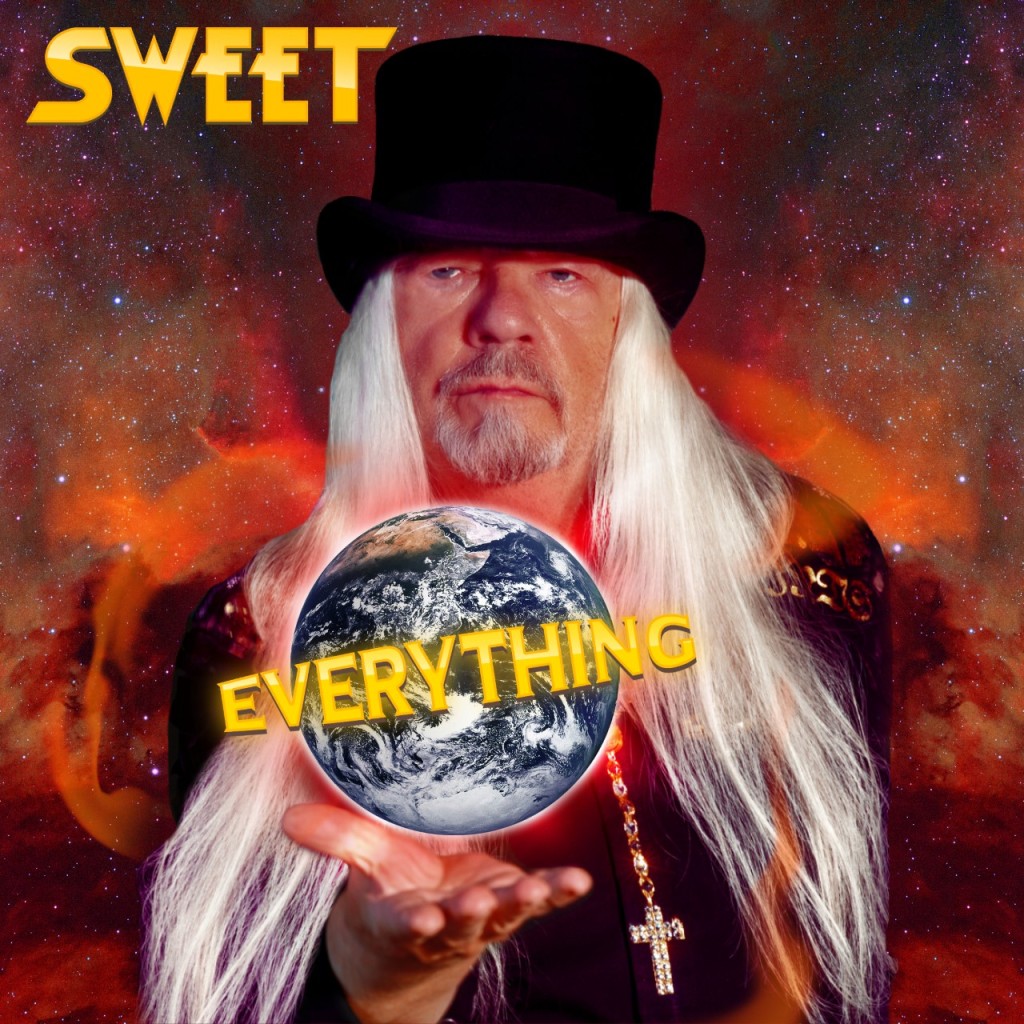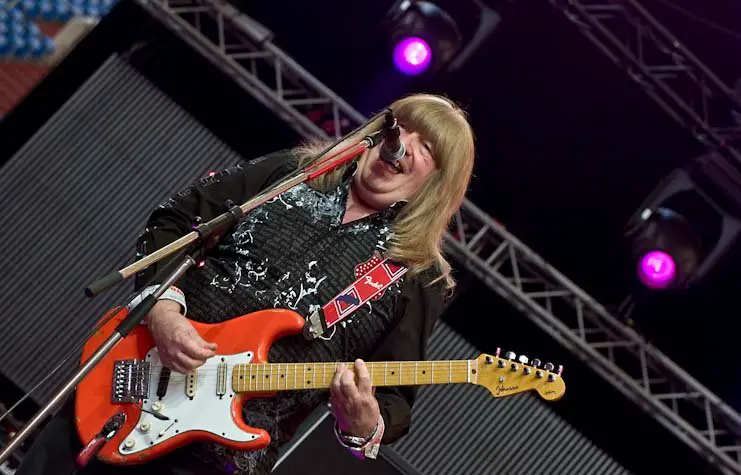All images courtesy of Glass Onyon PR

Recently, I had the pleasure of speaking with the legendary hero of Glam Rock, guitarist Andy Scott. As an original member of the classic 70s Rock outfit, Sweet, Andy Scott influenced generations of Rock bands and helped lay the foundation of what would become an explosion of Glam and Hair Metal in the 1980s.
Among other things, we touch on what he’s been up to during the lockdown, Sweets’ newest music, the band’s history, and importance, and what he’s looking forward to the most once COVID-19 breaks.
If you would like to learn more about Sweet, you can head over to the band’s webpage, and dig in. Once you’ve done that, check out this interview with Andy Scott. Cheers.
Andrew:
Andy, I appreciate you taking the time today. How have you been holding up over the last year or so? What have you been up to?
Andy:
Well, I think 2020 was a difficult year for everyone and 2021 wasn’t much better. Hopefully, as time and vaccines old fast 2022 might see the real kick start back to some form of normality. I am quite happy in my skin apart from a couple of health issues and am never bored with my own company, there are always things that need finishing, books, and paperwork that must be read and of course music! I also love to watch sport on TV.
Andrew:
Before we dive into your professional career, let’s go back a bit. What first got you hooked on music?
Andy:
I was quite lucky in that my parents loved music and at parties and Christmas there would be lots of singing, well it is what the Welsh are famous for. I guess the catalyst for my interest in becoming a musician began when a friend of my Dad brought a guitar to the house and showed me how to play a couple of chords. I was hooked. Then my brother, also a musician, and I saw The Shadows in the film The Young Ones, and that was the final piece of the jigsaw.
Andrew:
Who were some of your early influences?
Andy:
The Shadows, The Beatles, The Beach Boys, then along came bands like The Yardbirds with Clapton, Beck, and Page, and finally Jimi Hendrix. I was fortunate to be in a band that supported Jimi on his first tour in the UK and that was an epiphany. Many great guitarists that influenced have followed — Blackmore, Townsend, Zappa, Randy California, and a few more. All guitarists will hear another guy play a lick or a solo, and then it becomes part of your armory to use in your way and style.

Andrew:
So, you’ve got a new single out, which is actually a re-recorded version of “Everything.” Tell us more about the track, and why you chose to rerecord it. I also wanted to touch on your recent release Isolation Boulevard. Tell us about the reception that the record has received.
Andy:
Isolation Boulevard was put together in a couple of months between lockdowns when the rules were relaxed a bit. We also came to the conclusion that even though we were starting work on a new studio record of new material for Sony this was not the time to release an album of new songs. Timing is everything so they say. So, we decided to rerecord an album of songs that the fans love when we perform them live. As we were getting into the album and track listing I realized that we had quite a few songs that were part of the USA version of Desolation Boulevard, so Isolation Boulevard was born. We are about to go on tour in the UK and during one of our get-togethers to decide on fresh material the song “Everything” popped up, and the light bulb flashed and flashed when I heard Paul Manzi [Lead vocals], and Lee Small [bass and Vocals], and yours truly start singing the chorus. We had to get it recorded there and then.
Andrew:
Going all the way back now, take me through the formation of Sweet.
Andy:
The Sweet was formed in 1968 under the name “Sweetshop” when Brian Connolly and Mick Tucker left Wainwrights Gentleman [a function band]. They asked Steve Priest to join them as he was fast making a name for himself as a bass player in the West London area. Two guitarists came and went, Frank Torpey and Mick Stewart, before Andy Scott from The Elastic Band joined in the summer of 1970. The rest as they say is history.
Andrew:
You’re the last remaining member of that original classic lineup. Looking back, what are some of your favorite memories from the band’s early days?
Andy:
There are so many. Our first appearance on BBC Top of the Pops, “Blockbuster” hitting the No 1 spot in 1973, “Fox On The Run,” a song I had written for the European Desolation Boulevard album, then reworked as a single to become our biggest selling record, 1978’s “Love Is Like Oxygen” hitting high in the charts gaining prestigious awards, ASACAP and Ivor Novello. There were some pretty spectacular tours in the USA with Bob Seger, KISS, Alice Cooper, Cheap Trick, Journey, Sammy Hagar, and many more.

Andrew:
Many bands such as KISS, have said that if not for Sweet, they simply wouldn’t have ever existed. What are your thoughts on Sweet’s place within Rock and Glam history?
Andy:
I think we were probably underrated and though we have respect from our peers, the other bands, and musicians, I feel that if the Rock and Roll Hall of Fame came knocking it would be a shame, almost too late as I am the only one left. But hey the legacy lives on.
Andrew:
The early pioneers of Glam Rock such as Sweet, KISS, David Bowie, Slade, and more unknowingly laid the groundwork for the 1980s Hair Metal era. What are your thoughts on the trajectory of Glam Rock as it gave way to Metal in the 80s?
Andy:
This is a good point. When bands like Mötley Crüe broke through it was like looking at a snapshot of Sweet ten years on. The music was heavier and more reminiscent of our albums, and B-sides than the singles. But in cultural/fashion terms it is a direct line, a pure connection.
Andrew:
For new fans of Glam Rock and Sweet in general, what albums would you recommend for them to dive right in? Subquestion, what’s the most overlooked album by Sweet?
Andy:
I think the two albums that are generally under-viewed are Give Us A Wink, the follow-up album to Desolation Boulevard and Cut Above The Rest, the follow-up to Level Headed. I can’t let this pass by without mentioning the European only released album — Sweet Fanny Adams.

Andrew:
Easy one’s now. What are a few of your favorite albums, and why?
Andy:
–Electric Ladyland by Jimi Hendrix — Unbelievable experimental sounds still my favorite.
–Pet Sounds by The Beach Boys — No explanation needed.
-The Beatles — On shuffle.
-Led Zeppelin — 1/2/3/4, obviously.
-Edward Elgar, Ralph Vaughan Williams — Two British composers just press Olay.
–Hunky Dory by David Bowie — Was never off my turntable.
–In Rock by Deep Purple – A staple.
-The Who — Anything and everything.
Andrew:
What other passions do you have? How do those passions inform your music, if at all?
Andy:
Fly Fishing. Relax and let all troubles drift away.
Andrew:
What sort of equipment do you use in the studio, and the live setting?
Andy:
I am still retro on gigs. I used to use a Pete Cornish pedal board in the 70s and 80s, it was a monster the size of a mixing desk, sounded great but as travel restrictions kicked in and not possessing budgets of certain acts it had to be retired. I still have it of course, so, could be wheeled out in the future. Marshalls have always been a part of the Sweet guitar sound though the 70s seemed to bring out the “overkill” moment on stage where I had Marshal 2204sl, H&H, Fender Showman and 2x 950 Leslie cabs complete with UV lightshow. I have used a Boss ME-5 as the driver in my system, and have been since I was given one in the late 80s to use on a tour of Australia, and the USA. IIt has all the original analogue pedal sounds, and I have been using an Eventide H9 to bring in some of the later digital stuff. My rig is more manageable these days and suited to the venues we now play especially now that PA systems have caught up. I use 2 x 12 cabs mainly but still prefer 4 x 12 outdoors. In the studio, however, I am not afraid to use any device from the Pods through to Profilers such as Kemper.
Andrew:
Do you collect vinyl? CDs? Cassettes? Or are you all digital now? If you do collect physical media, why is that important to you? Why do you feel keeping physical media alive is important in this day and age?
Andy:
Digital is so convenient isn’t it? We can carry stuff around on a stick and play it anywhere. No more mixing a track in the control room, copying it to cassette [old school] or CD [not so old school] then nipping into the living room to play it on that system or run outside to the car to play it there. It is just as well that digital recording has leapt forward so much, I can’t hear the difference these days.
Andrew:
Last one. What’s next on your docket? What are you looking forward to most in the post-COVID world?
Andy:
Staying Alive and Living to Stay.

Interested in learning more about the music of Sweet? Check out the link below:
Dig this interview? Check out the full catalog of VWMusic Interviews, by Andrew Daly, here: www.vinylwritermusic.com/interviews





Leave a Reply